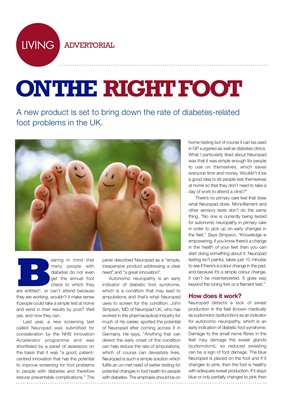
LIVINGLIVING ADVERTORIAL
ON THE RIGHT FOOT
A new product is set to bring down the rate of diabetes-related
foot problems in the UK.
B
earing in mind that
many people with
diabetes do not even
get the annual foot
check to which they
are entitled*, or can't attend because
they are working, wouldn't it make sense
if people could take a simple test at home
and send in their results by post? Well
yes, and now they can.
Last year, a new screening test
called Neuropad was submitted for
consideration by the NHS Innovation
Accelerator programme and was
shortlisted by a panel of assessors on
the basis that it was "a good, patientcentred
innovation that has the potential
to improve screening for foot problems
in people with diabetes and therefore
reduce preventable complications." The
panel described Neuropad as a "simple,
inexpensive product addressing a clear
need" and "a great innovation".
Autonomic neuropathy is an early
indicator of diabetic foot syndrome,
which is a condition that may lead to
amputations and that's what Neuropad
uses to screen for the condition. John
Simpson, MD of Neuropad UK, who has
worked in the pharmaceutical industry for
much of his career, spotted the potential
of Neuropad after coming across it in
Germany. He says, "Anything that can
detect the early onset of the condition
can help reduce the rate of amputations,
which of course can devastate lives.
Neuropad is such a simple solution which
fulfils an un-met need of earlier testing for
potential changes in foot health for people
with diabetes. The emphasis should be on
home-testing but of course it can be used
in GP surgeries as well as diabetes clinics.
What I particularly liked about Neuropad
was that it was simple enough for people
to use on themselves, which saves
everyone time and money. Wouldn't it be
a good idea to let people test themselves
at home so that they don't need to take a
day of work to attend a clinic?"
There's no primary care test that does
what Neuropad does. Monofilament and
other sensory tests don't do the same
thing. "No one is currently being tested
for autonomic neuropathy in primary care
in order to pick up on early changes in
the feet." Says Simpson, "Knowledge is
empowering; if you know there's a change
in the health of your feet then you can
start doing something about it. Neuropad
testing isn't painful, takes just 10 minutes
to see if there's a colour change in the pad,
and because it's a simple colour change,
it can't be misinterpreted. It goes way
beyond the tuning fork or a filament test."
How does it work?
Neuropad detects a lack of sweat
production in the feet (known medically
as sudomotor dysfunction) as an indicator
for autonomic neuropathy, which is an
early indication of diabetic foot syndrome.
Damage to the small nerve fibres in the
feet may damage the sweat glands
(sudomotors), so reduced sweating
can be a sign of foot damage. The blue
Neuropad is placed on the foot and if it
changes to pink, then the foot is healthy
with adequate sweat production. If it stays
blue or only partially changes to pink then